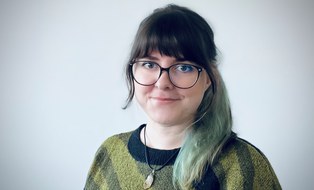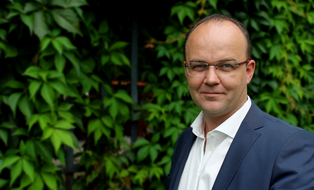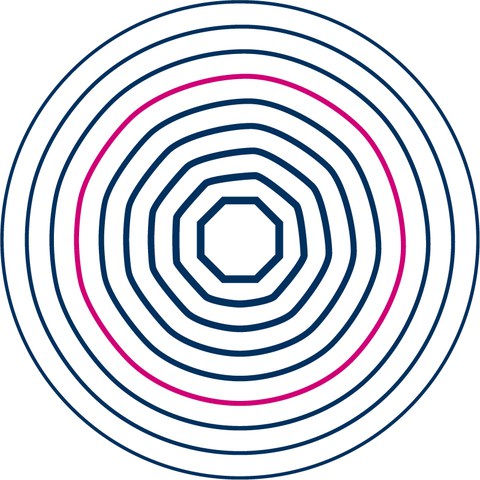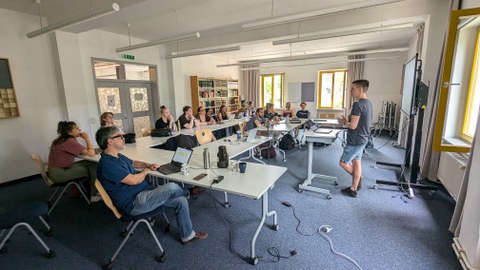Digital Humanities (Master’s degree)
Table of contents
Study program and course content
The four-semester Master's degree course in Digital Humanities is aimed at students from the humanities and social sciences who want to learn about and implement the possibilities of digitally supported teaching, research and communication in practice. The course is based on the Digital Humanities core curriculum (according to Sahle 2013).
It focuses on a broad basic education with computer science components and subsequent specialization in compulsory elective areas. These are:
- Society and history,
- Art and image,
- School and education or
- Language and Literature
They are supplemented by interdisciplinary topics such as data, law and ethics. Career prospects are developed in an internship semester together with partner institutions. Partner institutions include, for example, the Saxon State and University Library Dresden (SLUB), the Staatliche Kunstsammlungen Dresden (SKD), the Institute of History and Folklore of Saxony (ISGV), the Sorbian Institute (SI) and the Hannah Arendt Institute for Totalitarianism Research (HAIT).
The course content is geared towards acquiring the key skills that enable students to shape the knowledge society in the 21st century in a digital working and media world. These include the fundamentals of digital humanities, applied computer science and inter- and transdisciplinary project development. At the core are research and application-oriented methods of the Arts, Humanities and Social Sciences in the fields of digital text, education, culture, art, image and music studies. Specific legal principles in dealing with digital media and content as well as transfer possibilities between different cultural, educational and mediation institutions round off the program.
Prof. Alexander Lasch stellt den Master-Studiengang "Digital Humanites" vor. © CC BY 4.0 Alexander Lasch
Compulsory elective areas
The compulsory elective areas provide students with an in-depth insight into the digital humanities at the interface between the Arts, Humanities and Social Sciences and stakeholders in cultural, educational and mediation institutions such as museums, galleries, collections, libraries and archives.
In the compulsory elective area of society and history, the focus is on the connection between digital transformations and historical sources. This includes, for example, the provision of source corpora, their indexing, modeling and analysis using specific digital methods through to the transfer of knowledge into the public sphere.
In the compulsory elective area of Art and Image, the focus is on visual arts, architecture and visual cultures. In addition to digitally supported teaching and research, forms of digital mediation, for example in museums, digital exhibitions, etc., are of particular interest here.
In the compulsory elective area of school and education, the relationship between digitalization and education is reflected on a theoretical and empirical basis using exemplary questions from educational science (e.g. teaching and school development).
In the compulsory elective area of Language and Literature, the focus is on linguistics, literature and cultural studies issues under the auspices of digital methods. This includes the creation and use of machine-readable corpora, the creation and further development of digital editions, inter- and transdisciplinary project networking and the teaching of methods and results of digitally supported Linguistics, Literature and Cultural Studies.
Practice and research-oriented teaching
The partner forum can serve as an example of the interlinking of practice and research orientation in teaching at modern learning locations (here in the SLUB TextLab). It offers a unique opportunity to illustrate the close link between theory and practice in the Master's degree program and to present it to an interested public. Results from compulsory semester-accompanying internships in museums, research institutions, libraries and companies will be presented and insights into research projects will be given. The projects clearly show how the use of digital technologies can be used to pose innovative research questions in the humanities and cultural studies and at the same time combine them with practical requirements from and for the professional world. Based on their internship experience and the development of research questions, the students show how the horizon of the humanities is broadening in the digital transformation and how cooperation between science and society can be promoted.
Possible job profiles
Graduates of the Master's degree program have access to academic research opportunities; the degree qualifies them for a doctorate. Coordinating and curating work in museums, galleries, collections, libraries and archives, the development and supervision of municipal and tourist digital offerings as well as work in educational institutions are further possible professional fields. Close cooperation with the degree program's partner institutions and the student advisory service can provide orientation.
Abschluss Master of Arts und eine umfangreiche Ausbildung für eine digitale Arbeits- und Medienwelt. Das ist der Masterstudiengang Digital Humanities an der TU Dresden. Studiendekan und Professor Dr. Alexander Lasch geht auf die wichtigsten Fragen ein. © TUD GSW
Contact/advice
Academic Affairs Office GSW
Your contact person for this degree program at the Examination Office is
Heike Grahn
Phone: 0351 463 37302
E-mail:
Website: Examination Office
Student Advisory Service
 © Katharina Fritzsch
© Katharina Fritzsch
Studiengangskoordination Master "Digital Humanities"
NameKatharina Fritzsch M.A.
Send encrypted email via the SecureMail portal (for TUD external users only).
Studienbüro Bereich GSW:
BZW, Sockelgeschoss, Raum ASG06 Zellescher Weg 17
01069 Dresden
Deutschland
Office hours:
nach Vereinbarung
 © Alexander Lasch
© Alexander Lasch
Studiendekan "Digital Humanities"
NameMr Prof. Alexander Lasch
Send encrypted email via the SecureMail portal (for TUD external users only).


